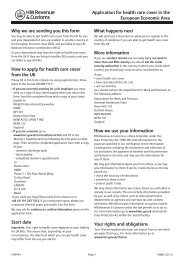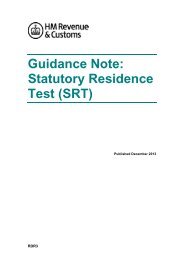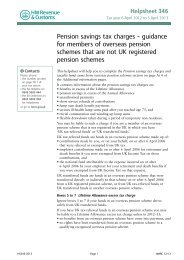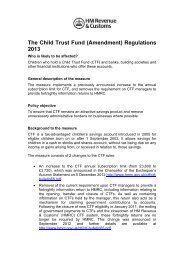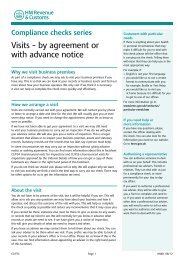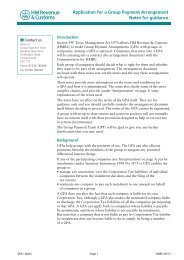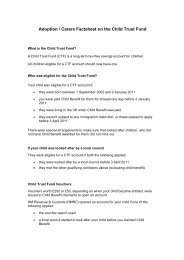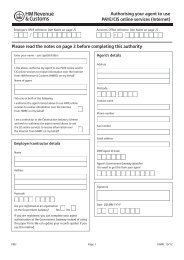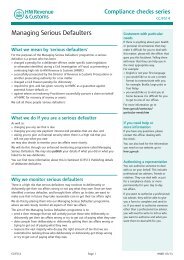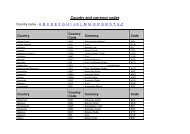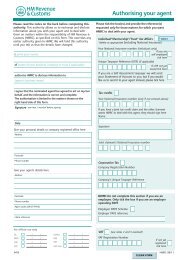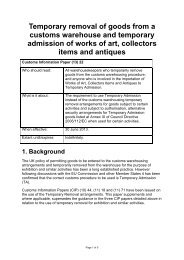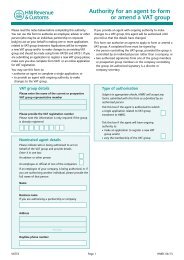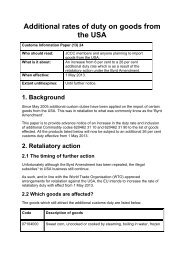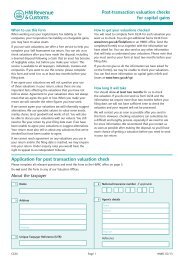IR20 - Residents and non-residents liability to tax in the United ...
IR20 - Residents and non-residents liability to tax in the United ...
IR20 - Residents and non-residents liability to tax in the United ...
Create successful ePaper yourself
Turn your PDF publications into a flip-book with our unique Google optimized e-Paper software.
This guidance does not apply from 6 April 2009. The guidance it conta<strong>in</strong>s is replaced by <strong>the</strong><br />
guidance provided <strong>in</strong> HMRC6 – Residence, Domicile <strong>and</strong> <strong>the</strong> Remittance Basis. It is kept<br />
available for those people who need <strong>to</strong> make reference <strong>to</strong> <strong>IR20</strong> for <strong>the</strong>ir <strong>tax</strong> affairs before<br />
5 April 2009.<br />
3.16 Some special provisions apply<strong>in</strong>g <strong>to</strong> those com<strong>in</strong>g <strong>to</strong> <strong>the</strong> UK are dealt with as follows<br />
4 Domicile<br />
• earn<strong>in</strong>gs of those who come <strong>to</strong> <strong>the</strong><br />
UK part way through a <strong>tax</strong> year: paragraph 5.4<br />
• lump sums from overseas pension<br />
schemes <strong>and</strong> provident funds: paragraph 5.16<br />
• UK Government securities: <strong>in</strong>terest<br />
aris<strong>in</strong>g <strong>in</strong> year of arrival <strong>in</strong> UK: paragraph 6.7<br />
• <strong>in</strong>vestment <strong>in</strong>come of those com<strong>in</strong>g<br />
<strong>to</strong> <strong>the</strong> UK part way through<br />
a <strong>tax</strong> year: paragraphs 6.18 onwards<br />
• <strong>tax</strong> allowances: paragraph 7.4<br />
• capital ga<strong>in</strong>s: paragraphs 8.3 - 8.6<br />
4.1 Domicile is a general law concept. It is not possible <strong>to</strong> list all <strong>the</strong> fac<strong>to</strong>rs that affect your<br />
domicile, but some of <strong>the</strong> ma<strong>in</strong> po<strong>in</strong>ts are expla<strong>in</strong>ed <strong>in</strong> this Chapter.<br />
4.2 Broadly speak<strong>in</strong>g, you are domiciled <strong>in</strong> <strong>the</strong> country where you have your permanent<br />
home. Domicile is dist<strong>in</strong>ct from nationality or residence. You can only have one domicile<br />
at any given time.<br />
Domicile of orig<strong>in</strong><br />
4.3 You normally acquire a domicile of orig<strong>in</strong> from your fa<strong>the</strong>r when you are born. It need<br />
not be <strong>the</strong> country <strong>in</strong> which you are born. For example, if you are born <strong>in</strong> France while<br />
your fa<strong>the</strong>r is work<strong>in</strong>g <strong>the</strong>re, but his permanent home is <strong>in</strong> <strong>the</strong> UK, your domicile of<br />
orig<strong>in</strong> is <strong>in</strong> <strong>the</strong> UK.<br />
Domicile of dependency<br />
4.4 Until you have <strong>the</strong> legal capacity <strong>to</strong> change it - see paragraph 4.5 - your domicile will<br />
follow that of <strong>the</strong> person on whom you are legally dependent. If <strong>the</strong> domicile of that<br />
person changes, you au<strong>to</strong>matically acquire <strong>the</strong> same domicile (a domicile of<br />
dependency), <strong>in</strong> place of your domicile of orig<strong>in</strong>.<br />
Domicile of choice<br />
4.5 You have <strong>the</strong> legal capacity <strong>to</strong> acquire a new domicile (a domicile of choice) when you<br />
reach age 16. To do so, you must broadly leave your current country of domicile <strong>and</strong><br />
settle <strong>in</strong> ano<strong>the</strong>r country. You need <strong>to</strong> provide strong evidence that you <strong>in</strong>tend <strong>to</strong> live<br />
<strong>the</strong>re permanently or <strong>in</strong>def<strong>in</strong>itely. Liv<strong>in</strong>g <strong>in</strong> ano<strong>the</strong>r country for a long time, although an<br />
important fac<strong>to</strong>r, is not enough <strong>in</strong> itself <strong>to</strong> prove you have acquired a new domicile.<br />
Married women<br />
4.6 Before 1974, when you married you au<strong>to</strong>matically acquired your husb<strong>and</strong>’s domicile.<br />
After marriage this domicile would change at <strong>the</strong> same time as your husb<strong>and</strong>’s domicile<br />
changed. If your marriage ended, you kept your husb<strong>and</strong>’s domicile until such time as<br />
you legally acquired a new domicile.<br />
This rule is modified by <strong>the</strong> terms of <strong>the</strong> double <strong>tax</strong>ation agreement between <strong>the</strong> UK <strong>and</strong><br />
<strong>the</strong> USA. A marriage before 1974 between a woman who is a US national <strong>and</strong> a man<br />
<strong>IR20</strong> 17<br />
HMRC 03/09



